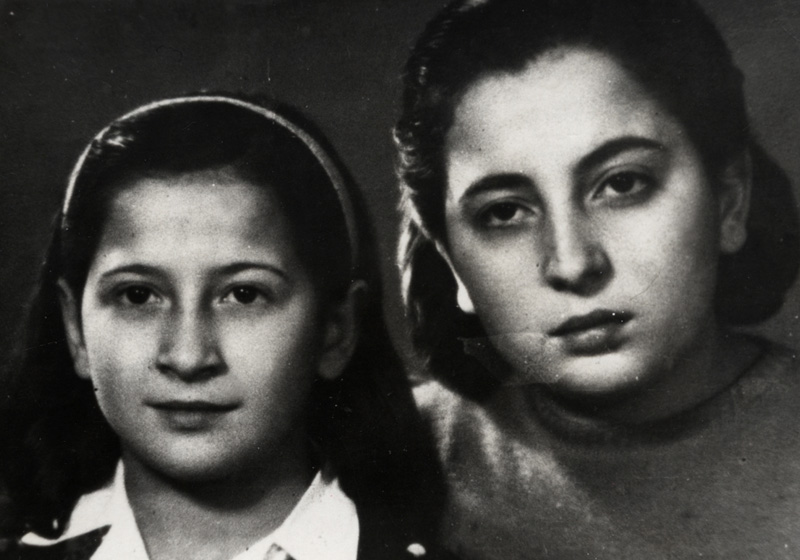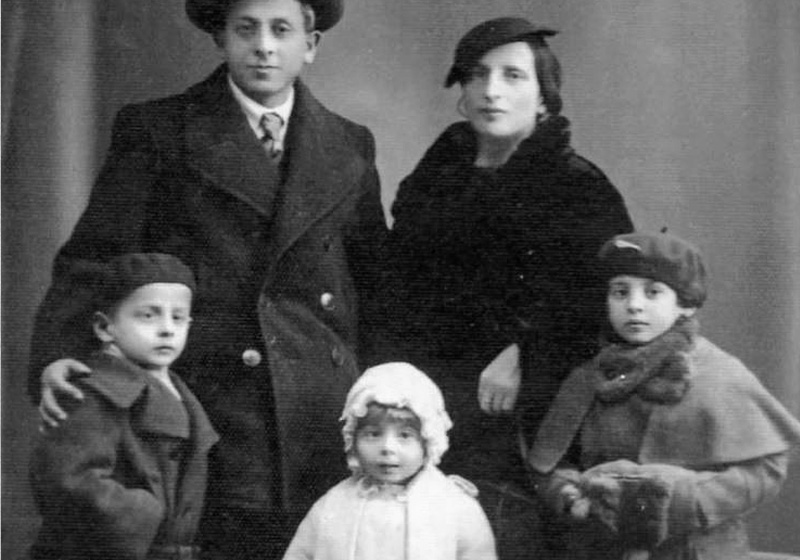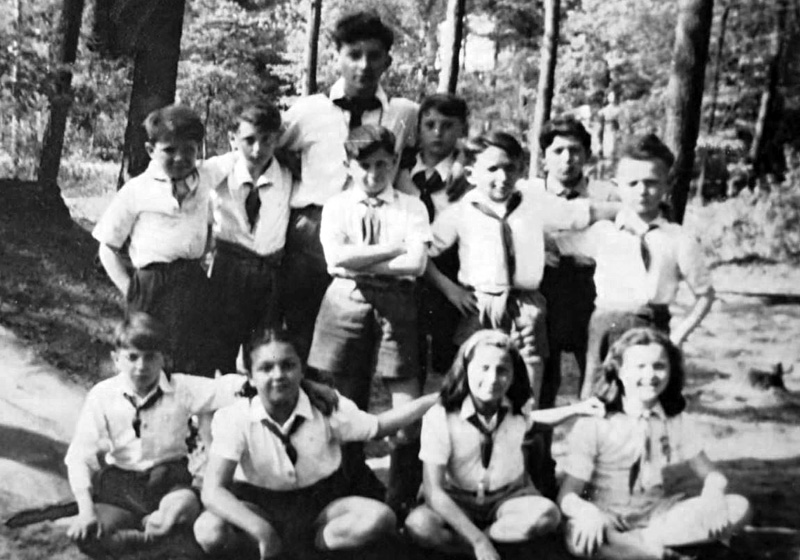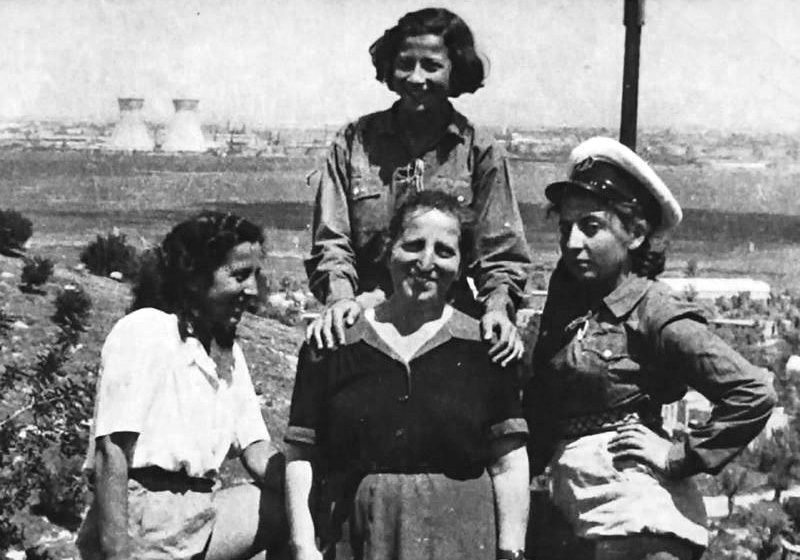Children's Homes for Holocaust Survivors
"My Lost Childhood"
Sarah Weinberg: Member of Hashomer Hatzair at the "Ilania" Children's Village
Antisemitic persecution began in Suceava in 1940, when the Romanian Army retreated from Bessarabia and northern Bukovina, which were annexed by the USSR. Government institutions moved from Czernowitz to Suceava. The Jews were blamed for the Romanian downfall, and many Jews were murdered. Terror against the Jews of Suceava started during the period of "Iron Guard" rule. Many Jews were imprisoned on the grounds that they were Communists. Jews who attended a synagogue where a red cover was used for the Torah Scroll were imprisoned and brought before a military tribunal. Part of the Jewish community building was confiscated as was one of the synagogues. German Army units arrived there and Jews were seized for forced labor in construction.
In July 1941, thousands of Jews from the surrounding villages and towns were evicted from their homes. Many found refuge in Jewish homes and synagogues in Suceava, and the Jewish community supported them. The anti-Jewish discrimination increased in intensity in August and September. House searches were conducted, mostly at night, and Jews were forbidden from leaving town or from entrusting belongings to Christians.
In October 1941, the Jews of Suceava were deported via Otaci to Transnistria, and brought to the Mogilev-Podolskiy ghetto. The Weinbergs were amongst those confined there. Zvi Weinberg described the deportation from Suceava in his diary:
The turmoil of departure was at its height in our area. The same scene kept recurring: babies crying and screaming hysterically. As the evacuation hour approached, people gathered to watch the Jews leaving. Many rejoiced: good riddance! And we asked ourselves: What did we ever do to them, to these people whom we lived amongst for so many years without the slightest friction, that they hate us so much? There were some who were genuinely sorry that we were being evacuated, but regrettably, they were very few. … It was painful to leave our home. My wife and children sobbed. … [at the train station] we had to pass desks, to register and leave our house-keys. … We handed over all our documents. At that moment, we became worthless. They started pushing us onto wagons, which were originally designated for transporting cattle, and were therefore filthy with garbage. … I will never forget climbing up into the cattle cars, while being screamed at and prodded with rifle butts. … They brought all the disabled people in the town and threw them into the cattle cars. … hospital patients, post-operative patients with no medical supervision, the town lunatics – they didn't leave anyone behind. They sent everyone to their deaths. (Zvi Weinberg, From the Horrors of Transnistria to New Life in Kibbutz Magen, pp. 25-27)
A short time later, Jews from the Suceava community, including the Weinbergs, escaped from Mogilev-Podolskiy to the Murafa ghetto. The living conditions were very hard; the deportees were overcrowded and suffered from cold and starvation. A typhus epidemic flared up there due to the lack of sanitation, and many perished. Mina fell ill and burned up with fever. Her daughter Yehudit recalls:
It was winter, freezing cold. Mother lay in bed. She was as thin as a board, and her cheekbones jutted out prominently. I looked at her and thought, she is no longer of this world. She lay without moving. Father was not at home, but he left instructions that I should give her water with a teaspoon every two hours, and I made sure to bring the teaspoon to her lips and to give her a little water to drink. She was yellow. … towards evening, father returned from the market with Dr. Kenig. … The next morning, Mother opened her eyes and started asking where my sisters, Sarah and Malka were. … She was very frail. … Within a week, she was herself again.
Zvi was taken from the ghetto for forced labor, and 11-year-old Yosef helped to support the family. There was a committee and a soup kitchen in the Murafa ghetto. Zvi Weinberg wrote in his diary:
June 1942. I'm still working in the quarry. Our Ukrainian supervisor, a beast of prey with a human face, works for the Nazis and Romanians. The fate of the four members of our group was in his hands: to live or to die. He liked smoking foreign cigarettes. We supplied him with cigarettes, and he would smoke them and beat us mercilessly. … One day he turned to me: "Dabai Papiros [give me a cigarette]!" I told him I didn't have any. That was enough to provoke him. Slaps to the face and beatings rained down on me and disorientated me completely. I continued to work under this hail of beatings. Someone in the group tried to defend me, and he was also beaten. … That day, he ordered all the group members to rest, except for me. … He beat me so brutally that I lost consciousness. … When I came round, I found myself amongst the bushes, where I had been thrown at that beast's order. He thought I had died. ... I lay there in a stupor for some seven hours. … My friends built a stretcher out of branches, and that's how I made it home. (From the Horrors of Transnistria to New Life in Kibbutz Magen, pp. 66-67)
The Weinbergs were in Murafa from November 1941 until their liberation by the partisans in March 1944. They returned to Suceava in May to find their house ransacked. Approximately one year later, they moved to Bacau where the older children Yehudit and Yosef joined the Hashomer Hatzair youth movement activities, and swept the rest of the family along with them. Zvi and Mina decided to immigrate to Eretz Israel (Mandatory Palestine) and made their way to Italy. Passage to Bucharest was organized for Malka and Sarah under the auspices of Hashomer Hatzair, in preparation for their journey to the "Ilania" children's village in Apeldoorn, the Netherlands.
At "Ilania", Sarah was placed with the "Bnei Midbar" 9-11-year-olds' group of Hashomer Hatzair. Sarah recalls:
It was a period of growth. … I believe that this period saved us in many respects … We were kept very much separate from our parents and siblings. First and foremost they enveloped us in Eretz Israel, and what Eretz Israel meant, its history from Bar Kochba onwards. … we had activities. … there was a counsellor who really brought things alive for us, also war-related things. … We learned the history of Eretz Israel: Why Eretz Israel is ours, and why we were returning there. … And at school, we also studied Zionism and Hebrew.
In 1948, Malka and Sarah immigrated to Israel together with the "Ilania" children. Their parents immigrated shortly before them. Yehudit and Yosef continued to be active helping Jews immigrate from Romania. Yehudit immigrated to Israel in 1950, and was followed by Yosef a year later.





